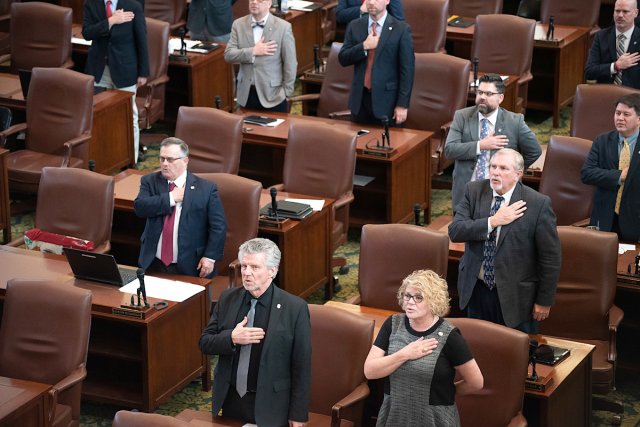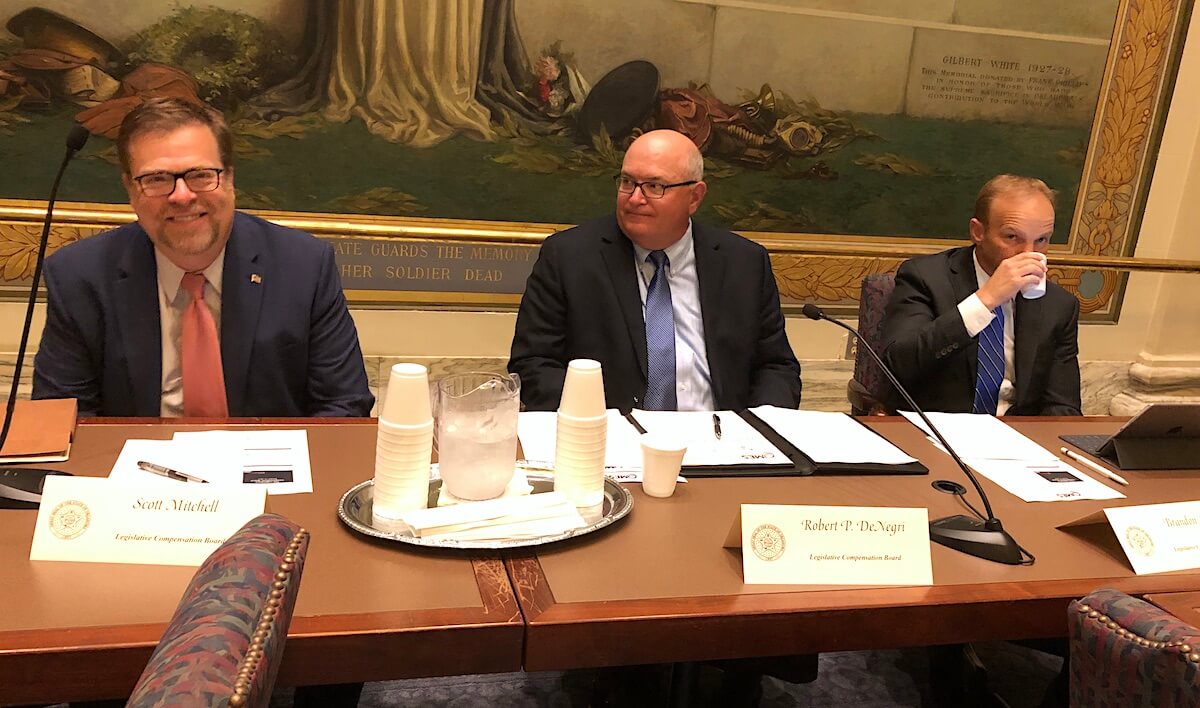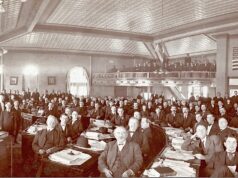
Sporting an entirely new membership for its biennial meeting, the Oklahoma Legislative Compensation Board voted this morning to increase legislative pay for the first time in 20 years, setting the new baseline figure at $47,500 only two years after the last board cut it 8.8 percent.
Almost all members of the board argued in favor of raising the $35,021 figure pay as an attempt to make service in the Oklahoma Legislature more palatable to parents, young professionals and other citizens who might have to give up or pause their personal employment.
“You want to make sure you have the right people feel empowered to come and serve,” said board member James O’Dea, who teaches history at Regent Preparatory School. “I want to know what caused that salary to go down from $38,000 to $35,000 and what was going on at that board meeting.”
Other members attempted to answer O’Dea’s question before turning to Assistant Attorney General Lyn Martin-Diehl, who serves as the board’s counsel.
“The minutes would show that it was somewhat budgetary and somewhat punitive,” Martin-Diehl said.
‘We want people here who are smart and could do other things’

Whether the 2017 Legislative Compensation Board cut legislative pay amid a contentious state budget fight for punitive purposes is a matter of some debate. I attended the October 2017 meeting and heard then-board members swear that their action was not punitive, and I wrote a piece that questioned the truthfulness of that claim.
“What’s that old adage?” I asked rhetorically. “Never believe something until you hear people deny it?”
While it told the stories of young lawmakers just starting their families, my 2017 coverage of legislative pay also took the form of a first-person analysis, making it seem disingenuous for me today to write this article as traditional news coverage. Multiple members of the new Legislative Compensation Board told me they had read my previous piece and found it compelling in its argument that cutting legislative pay was short-sighted.
They argued today what I argued then: Low compensation for a citizen-legislature caters disproportionately to older, wealthy individuals near the end of their professional careers and young, inexperienced Oklahomans who have just graduated college.
“In this sense we may not be competing against other states. We really are trying to get the best and brightest in our state to run and represent (their communities) whether it is a single parent or a firefighter or somebody else,” said OKC real estate developer Jonathan Dodson. “How do we bring up the next generation of leaders in our state to lead regardless of age?”
Dodson’s question was relevant, and in a moment where he feared the board would not be considering the issue deeply, he opened board discussion by saying he had made a consumer price index calculation based on the $38,400 salary lawmakers had held from 1998 until 2017.
In today’s consumer dollars, Dodson said, the $38,400 figure in 1998 would equal $59,000 today.
“That feels like a pretty big jump to go from our current pay,” Dodson said. “But I think if we’re just trying to have some kind of baseline of reflection for what we were paying legislators and what they could afford in 1998, it would be about $59,000.”
Brandon Long, an attorney with McAfee & Taft, agreed that Oklahomans should not want a Legislature comprised of only wealthy people.
“I think we want people here who are smart and could do other things but choose to do this as public service,” Long said. “It seems like an around-the-clock job, and they’re not paid relatively (well).”
Board member Scott Mitchell agreed, calling the claim that lawmakers only work four months a year “patently false.” He referenced the 2017 legislative pay cut and called it “ridiculous.”
“It was punitive. There was no doubt about that,” Mitchell said. “I think we’ve got to find a sweet spot.”
How the board ultimately negotiated toward a supposed sweet spot was interesting to watch, even if comically disjointed at times. One observer noted that if Oklahoma is going to task citizen boards with major decisions, perhaps Robert’s Rules of Order should be taught in all high schools.
Prior to making any motion, board Chairman Robert DeNegri, the chief financial officer for Tyler Media, warned that raising legislative pay dramatically would be “a very bad optic.”
“The only thing that the citizens of Oklahoma are going to focus on if we set this number is the increase,” DeNegri said. “A lot of our citizens have lost jobs — known people who have lost jobs. So we’ve got to find that balance.”
Clarifying that he is not a voting member of the board, Oklahoma Management and Enterprise Services director John Budd offered his two cents.
“It’s surprising to me that we want a Legislature that represents Oklahomans, but we don’t pay them in a way that represents Oklahomans,” Budd said. “We end up with very young people and wealthy people.”
Still, DeNegri urged caution and made an initial motion to raise legislative pay to $43,000, which he said was a 3 percent increase beyond the $38,400 figure that had been slashed to roughly $35,000 two years prior.
“Everybody who works in this building knew what the salaries were when they ran for office,” DeNegri said.
Dodson responded quickly.
“I would just say that I’m not worried about the people in this building. I’m worried for the people out there who are considering (whether to run for office),” Dodson said.
Mitchell made a counter motion to set legislative pay at $52,000, but Dodson said he found that figure too high.
“I’ll counter your counter at $47,500,” Dodson said.
After parliamentary hoopla, the board ultimately voted to approve Dodson’s motion and subsequently increased the stipend for speaker of the House and the Senate’s president pro tempore position to $17,932. Stipends for other leadership positions were also raised to $12,364.
The Oklahoma Legislature is scheduled to convene for its next regular session on Monday, Feb. 3, 2020, but the legislative pay increase will not take effect until 15 days after the 2020 general election.
OEA president applauds legislative pay raise
Later Tuesday, the president of the Oklahoma Education Association released a statement supporting the legislative pay raise.
“It’s important that we pay legislators enough to be able to do their jobs, and we want public office to be open to all Oklahomans — not only the rich,” said Alicia Priest, OEA president. “Just like teaching isn’t a seasonal job, neither is the work of our legislators. We are encouraged that our economy is healthy enough to improve salaries for all state workers and we look forward to working with the legislature next spring to continue improving funding public education. Our students need teachers and support professionals who are paid appropriately, and our retirees desperately need a cost-of-living adjustment. All public servants must be able to afford to do their jobs.”
Oklahoma public school educators have received pay raises two years in a row, and numerous educators have run for and won seats in the Legislature.
Currently, however, state law prevents lawmakers from holding second state positions, which includes teaching contracts with public schools. As a result, educators who win legislative elections are forced to resign from their teaching positions.
(Update: This story was updated at 2:55 p.m. Tuesday, Oct. 15, to include comment from Alicia Priest.)





















